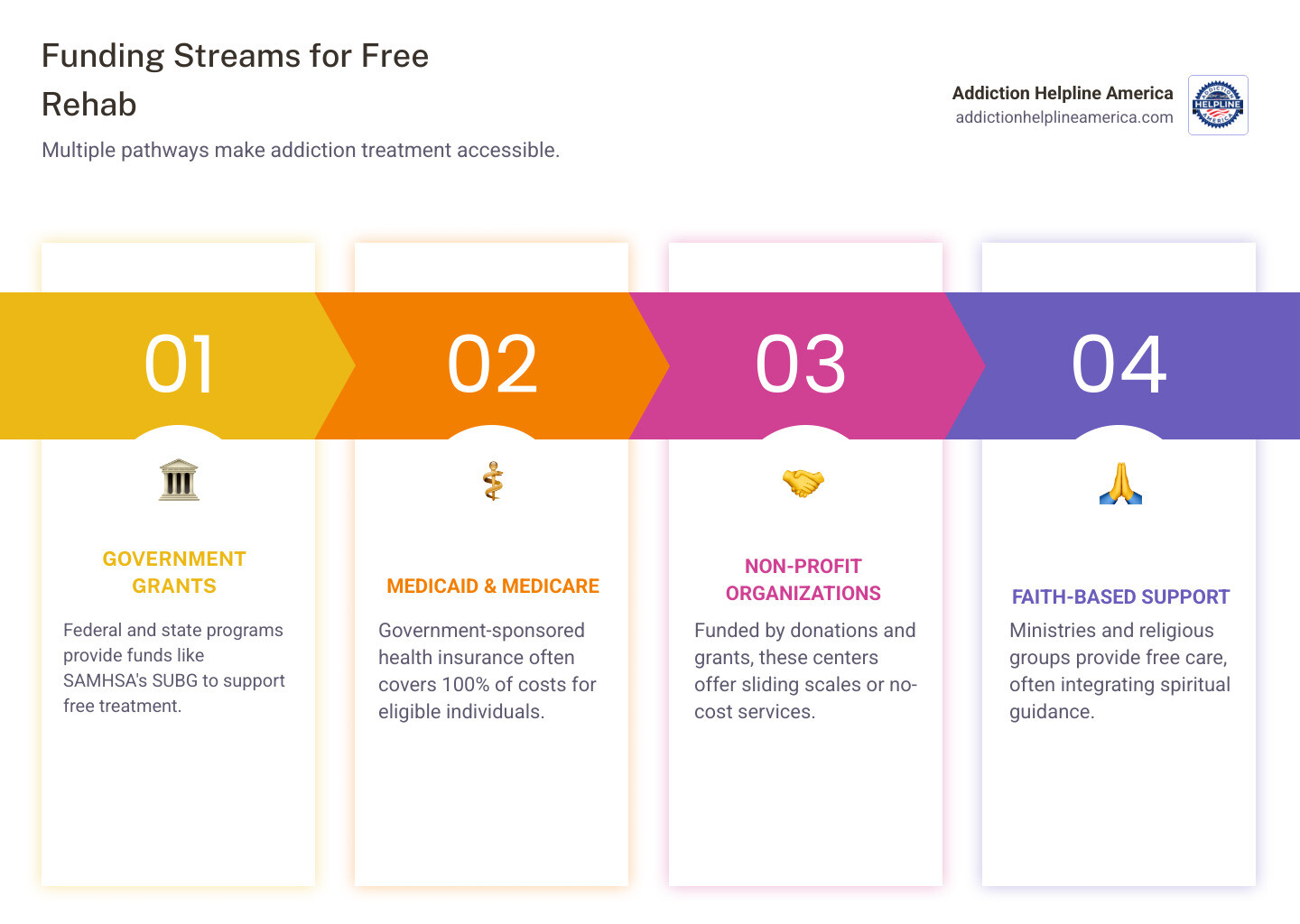
Understanding Your Options for Affordable Addiction Treatment
Are drug rehab centers free? Yes, free and low-cost drug rehab centers exist. “Free” usually means the cost is covered by government grants, Medicaid, nonprofit donations, or faith-based organizations. These programs are a lifeline for those who can’t afford private treatment.
Key funding sources for free or low-cost care include:
- State-funded programs for eligible residents.
- Medicaid and Medicare, which can cover 100% of costs for qualified individuals.
- Faith-based and nonprofit centers that use donations and grants to offer services on a sliding scale or at no cost.
Eligibility often requires proof of residency, income, and lack of adequate insurance. While nearly half of all treatment facilities offer free or minimal-payment options, they often have waiting lists and specific criteria.
For many families, the financial barrier to addiction treatment feels impossible. The good news is that multiple pathways exist to get help without unaffordable bills.
At Addiction Helpline America, we guide individuals and families through finding and accessing free or affordable treatment. We connect people with state programs, Medicaid-covered facilities, and community resources that match their needs. Our experience shows that when cost is removed as a barrier, recovery becomes possible for everyone ready to take that first step.
Must-know are drug rehab centers free terms:
- Top Alcohol & Drug Rehab Centers in Los Angeles, California
- does rehab centers give you drugs
- Prescription Drugs Treatment
The Reality of “Free” Rehab: How It’s Funded
When someone asks “are drug rehab centers free?”, the answer is that while treatment has costs, you may not have to be the one to pay. Funding comes from a patchwork of sources. Government funding supports state-run programs, non-profits use charitable donations, and faith-based ministries leverage their resources to serve the community.
Our research shows that approximately 45% of treatment facilities offer free or minimal payment options, and 58% provide sliding fee scales based on what you can afford. This approach recognizes that addiction can affect anyone, regardless of their financial situation.
The Role of Government Grants and Insurance
Federal and state governments are key to making rehab accessible. The Substance Abuse and Mental Health Services Administration (SAMHSA) is the primary source of drug rehab grants, channeling funds to public and private non-profit centers. One of its main programs is the Substance Use Prevention, Treatment, and Recovery Services Block Grant (SUBG), which supports treatment in every state.
Medicaid is another game-changer. This federal-state program covers addiction treatment for eligible low-income individuals. Thanks to The Affordable Care Act (ACA), substance use disorder services are now essential health benefits, meaning most insurance plans must cover them. For those who qualify, Medicaid often covers 100% of treatment costs. Our guide on Rehab Centers That Accept Medicaid has more details.
Medicare also provides coverage for those 65 and older or with certain disabilities, and VA benefits offer comprehensive treatment for veterans.
Non-Profit and Faith-Based Funding Models
Beyond government programs, a support system built on community donations and private endowments provides many free and low-cost options. Non-profit centers operate on grants and charitable contributions, focusing on saving lives rather than making a profit.
Faith-based programs add another vital layer to this safety net. Many offer spirituality-based residential programs that include room and board. While rooted in religious traditions, these centers typically welcome anyone seeking help. They often combine spiritual guidance and peer support with proven recovery methods, such as 12-Step model integration. The spiritual component is offered as a source of strength, not a requirement for conversion.
Together, these funding models create a network where “are drug rehab centers free?” can be answered with genuine hope.
Types of Free and Low-Cost Rehab Programs
The good news is that are drug rehab centers free options come in many forms to meet different needs.
- State-funded facilities, managed by state health departments, offer a full spectrum of services for residents who meet income and insurance requirements.
- Non-profit centers rely on donations and grants to provide care, often on a sliding fee scale based on income.
- Faith-based programs integrate spiritual guidance with evidence-based treatment, with some offering free residential programs that include room and board.
The types of care available mirror those in private facilities. Inpatient treatment provides a full-time, structured environment, while outpatient programs offer flexibility for those with work or family obligations. Medical detox is often the critical first step for a safe withdrawal, followed by counseling and aftercare planning to support long-term recovery.
Services Included in Free Addiction Treatment
Free doesn’t mean inadequate. While luxury amenities are absent, the clinical care is comprehensive and evidence-based. A typical treatment plan includes:
- Initial Assessment: Professionals evaluate your substance use history, mental and physical health, and personal circumstances to create a custom plan.
- Medically Supervised Detox: For substances like alcohol, opioids, and benzodiazepines, medical monitoring ensures a safe withdrawal process.
- Therapy and Counseling: Individual therapy addresses underlying issues like trauma and mental health conditions. Group counseling provides a powerful sense of community and shared experience. Family therapy helps repair relationships damaged by addiction.
- Relapse Prevention and Life Skills: You’ll learn concrete strategies for handling cravings and high-risk situations, along with practical life skills like budgeting and job searching.
- Aftercare Support: The program connects you with ongoing resources like sober living homes, outpatient counseling, and support groups (e.g., AA/NA) to support your long-term journey.
Specialized Programs for Priority Populations
Many free programs offer specialized services for groups with unique needs:
- Veterans: VA benefits provide access to treatment where staff understand military culture and service-related trauma.
- Pregnant Women: These individuals often receive priority placement in programs that combine addiction treatment with prenatal care.
- Homeless Individuals: Programs may offer case management to help secure housing and employment alongside treatment.
- Court-Ordered Treatment: These programs provide an alternative to incarceration, helping individuals address addiction through comprehensive outpatient services.
For a full overview of available support, see our Addiction Help Resources: Ultimate Guide. At Addiction Helpline America, we connect individuals from these priority populations with the specialized programs they need.
So, are drug rehab centers free? Qualifying for No-Cost Treatment
The question of are drug rehab centers free naturally leads to another: “Can I qualify?” While free treatment exists, it’s designed for those who meet specific criteria. If you’re facing financial hardship, there’s a strong chance you’ll qualify for some form of assistance. The application process ensures that limited resources go to those who need them most.
Eligibility for State-Funded and Government Programs
State-funded and government-backed centers typically assess the following factors:
- Residency and Citizenship: You must prove you are a U.S. citizen or legal resident and live in the state providing the service.
- Financial Need: You’ll need to provide income documentation (pay stubs, tax returns) to show you meet low-income guidelines.
- Insurance Status: These programs prioritize individuals who are uninsured or underinsured.
- Priority Status: Certain groups, such as pregnant women, veterans, and those with co-occurring mental health disorders, may receive priority placement.
The Application and Enrollment Process
The process generally begins with a clinical assessment to determine the appropriate level of care. After that, you’ll need to provide documentation.
Documents you may need:
- Driver’s license or state ID
- Proof of residency (e.g., utility bill)
- Proof of income (e.g., pay stubs, tax returns)
- Relevant medical records
Waitlists are a common reality for free programs due to high demand. It’s wise to get on multiple lists and stay in regular contact with each facility. When a spot opens, the facility will guide you through intake coordination, which includes final paperwork and orientation.
This process can be daunting, but you don’t have to do it alone. At Addiction Helpline America, we help people steer these steps every day. Our Complete Guide Free Rehab Riverside County provides a real-world example of how the process works.
How to Find Free and Affordable Rehab Centers Near You
When you’re ready for recovery, knowing where to look for are drug rehab centers free options is the first step. Powerful resources are available to help you find care in your area.
Using National and Local Directories
- SAMHSA National Helpline: A free, confidential, 24/7 service that provides referrals to local treatment facilities and support groups.
- SAMHSA’s Treatment Locator (findtreatment.gov): A searchable online database to find facilities by location and filter by payment options, including free services.
- State Behavioral Health Agencies: Your state’s health department website lists state-funded facilities and outlines eligibility requirements.
- 211 Helpline: Dial 211 to connect with a service that provides information on local resources, including addiction treatment.
At Addiction Helpline America, we simplify this search with personalized guidance. Explore our general guide on Drug Detox and Rehab Facilities Near Me or use our location-specific search at Drug Rehab: Near You.
What if I Don’t Qualify for Free Rehab?
If you don’t qualify for completely free rehab, affordable options are still available.
- Sliding Scale Fees: Offered by over half of treatment facilities, these programs adjust costs based on your income.
- Payment Plans: Many centers allow you to pay for treatment over time in manageable monthly installments.
- Rehab Scholarships and Grants: Non-profits and private foundations may offer financial aid to cover treatment costs. Inquire directly with facilities about these opportunities.
- Telehealth and Online Rehab: Virtual treatment can be a more affordable and convenient option. As we’ve seen, Teletherapy as a helpful resource has made care more accessible for many.
Our admissions navigators at Addiction Helpline America specialize in finding payment solutions. Financial constraints are real, but they don’t have to be a barrier to the recovery you deserve.
Weighing the Pros and Cons: Free vs. Paid Rehab
When considering are drug rehab centers free versus paid options, it’s important to understand the trade-offs. Both paths can lead to recovery, but they offer different experiences. Free programs remove the cost barrier, while paid programs may offer more immediate access and amenities. The best choice is the one that gets you help when you need it.
| Factor | Free Rehab | Paid Rehab |
|---|---|---|
| Cost | Minimal to none (covered by grants, Medicaid, etc.) | Significant (covered by private insurance, out-of-pocket) |
| Wait Times | Often long, can be weeks or months | Generally shorter, sometimes immediate admission |
| Amenities | Basic, functional facilities | Luxurious, private rooms, diverse recreational options |
| Staff Ratio | Potentially higher client-to-staff ratio | Lower client-to-staff ratio, more individualized attention |
| Individualization | More standardized treatment models | Highly personalized treatment plans, diverse therapies |
| Accessibility | High for eligible individuals | Limited by financial means |
Potential Drawbacks of free drug rehab centers
Be aware of potential challenges with free treatment. Long waiting lists are common due to high demand, which can be risky for someone in crisis. Facilities are typically basic, with shared rooms and limited amenities. You may also find larger group sizes and less one-on-one time with counselors, leading to more standardized treatment models. However, even a basic program is far better than no treatment at all.
Benefits of free drug rehab centers
The most significant advantage of free rehab is the no cost barrier, making treatment accessible to anyone regardless of their financial situation. These programs provide access to essential, evidence-based care, including detox, therapy, and aftercare planning. The supportive community is another powerful benefit, as you connect with peers who share similar life challenges. For many, free rehab is a critical lifeline for recovery that focuses on core treatment, not luxury extras.
At Addiction Helpline America, we’ve seen thousands achieve lasting recovery through free and low-cost programs. The path may look different, but the destination—a life free from addiction—is the same.
Frequently Asked Questions about Free Drug Rehab
You’re not alone in having questions about are drug rehab centers free. Here are answers to some of the most common concerns.
How long do free rehab programs typically last?
Program length varies based on individual needs. Most free inpatient programs last from 30 to 90 days. Some long-term options can extend for several months. The right duration for you will be determined by a clinical assessment of your situation and progress. Treatment is often a continuum, starting with inpatient care and transitioning to outpatient support.
Are there specific free rehab programs for cocaine addiction?
Yes, most free rehab centers are equipped to treat cocaine addiction alongside other substance use disorders. Your treatment plan will be individualized to address the specific challenges of cocaine use, such as intense cravings and psychological dependence. For more details, see our Cocaine Addiction Rehab: Ultimate Guide.
What should I do if I’m on a waitlist for a free rehab center?
A waitlist can be frustrating, but you can use this time proactively to build a foundation for your recovery.
- Get on multiple waiting lists to increase your chances of getting a spot sooner.
- Attend free support groups like Alcoholics Anonymous (AA) or Narcotics Anonymous (NA) to build a support network.
- Seek outpatient counseling to learn coping strategies while you wait.
- Use addiction hotlines for immediate support if you feel at risk.
- Stay in contact with the rehab center to show your commitment.
- Develop a safety plan with a trusted person that outlines how to handle triggers and who to call in an emergency.
Any action you take toward recovery is a step forward. At Addiction Helpline America, we can help you find resources to stay supported while you wait.
Your Path to Recovery Starts Now
The journey to recovery is challenging, but cost should never be a barrier. As this guide has shown, the answer to are drug rehab centers free is yes—genuine pathways to no-cost and low-cost treatment are available now.
Through government-funded programs, Medicaid, non-profits, and faith-based initiatives, thousands of people get the help they need every day. These programs provide essential, evidence-based care, from detox to therapy and aftercare planning. They are a critical lifeline for individuals and families trapped in the cycle of addiction.
Taking the first step can feel overwhelming, but you don’t have to do it alone.
At Addiction Helpline America, we are dedicated to providing personalized, confidential support. Our mission is to connect you with the right drug and substance abuse treatment program for your unique needs. We understand the urgency and are here to help you find real help—fast.
Your path to recovery starts now. The resources are available, and the support you need is just a phone call away. Reach out to us today, and let’s take that crucial first step together.
Our helpline is 100%
free & confidential
If you or someone you care about is struggling with drug or alcohol addiction, we can help you explore your recovery options. Don’t face this challenge alone—seek support from us.
Programs
Resources
Will my insurance
cover addiction
treatment?
We're ready to help
Find the best
drug or alcohol treatment
center
Are you or a loved one struggling with addiction? Call today to speak to a treatment expert.
















